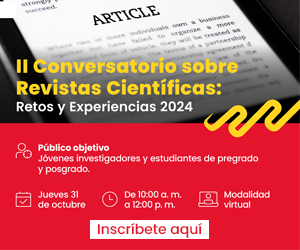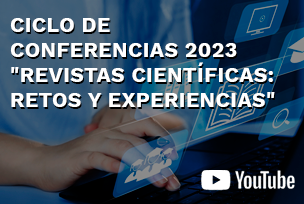El rol de la simulación episódica en el despliegue de conductas prosociales en ambientes competitivos de contextos intergrupales
DOI:
https://doi.org/10.20453/rph.v16i1.5168Palabras clave:
simulación episódica, conductas prosociales, ambientes competitivos, contextos intergrupalesResumen
Este estudio examinó el efecto modulador de la simulación episódica en la relación entre ambientes competitivos y conductas prosociales en contextos intergrupales. En una muestra de 120 estudiantes universitarios de Santa Marta, Colombia, se observó que la presencia de un ambiente competitivo disminuye las conductas de ayuda en
comparación con entornos no competitivos. La simulación episódica no altera la probabilidad de manifestación de conductas prosociales en ambientes competitivos. Estos resultados contrastan con investigaciones previas y sugieren la influencia de diversos factores metodológicos y contextuales. Se discuten las implicaciones para el diseño de futuras investigaciones que aborden la simulación episódica y la dinámica intergrupal, destacando la necesidad de considerar condiciones más ecológicas y realistas en los paradigmas de investigación.
Descargas
Citas
Aknin, L. B., Van de Vondervoort, J. W., & Hamlin, J. K. (2018). Positive feelings reward and promote prosocial behavior. Current Opinion in Psychology, 20, 55-59. https://doi.org/10.1016/j.copsyc.2017.08.017
Arenas, L. F., Rangel, H. S., Cortés, A. y Palacio, L. A. (2021). Validación en español del índice de reactividad interpersonal (IRI) en estudiantes universitarios colombianos. Psychology, Society & Education, 13(3), 121-135. https://doi.org/10.25115/psye.v13i3.3307
Bellucci, G., Camilleri, J. A., Eickhoff, S. B., & Krueger, F. (2020). Neural signatures of prosocial behaviors. Neuroscience & Biobehavioral Reviews, 118, 186-195. https://doi.org/10.1016/j.neubiorev.2020.07.006
Blount-Hill, K.-L. (2021). Proposing a social identity theory of interspecies dominance. Biological Conservation, 254, 108969. https://doi.org/10.1016/j.biocon.2021.108969
Böhm, R., Rusch, H., & Baron, J. (2020). The psychology of intergroup conflict: a review of theories and measures. Journal of Economic Behavior & Organization, 178, 947-962. https://doi.org/10.1016/j.jebo.2018.01.020
Bruneau, E. G., Cikara, M., & Saxe, R. (2015). Minding the gap: narrative descriptions about mental states attenuate parochial empathy. PLoS ONE, 10(10), e0140838. https://doi.org/10.1371/journal.pone.0140838
Carlsson, F., Kataria, M., Lampi, E., & Levati, M. V. (2017). Doing good with other people’s money: an experiment on people’s (UN) willingness to grant others the freedom to choose. Journal of Behavioral and Experimental Economics, 71, 79-87. https://doi.org/10.1016/j.socec.2017.09.005
Chang, L. W., Krosch, A. R., & Cikara, M. (2016). Effects of intergroup threat on mind, brain, and behavior. Current Opinion in Psychology, 11, 69-73. https://doi.org/10.1016/j.copsyc.2016.06.004
Cikara, M., & Van Bavel, J. J. (2014). The neuroscience of intergroup relations: an integrative review. Perspectives on Psychological Science: A Journal of the Association for Psychological Science, 9(3), 245-274. https://doi.org/10.1177/1745691614527464
Dannenberg, A., & Martinsson, P. (2021). Responsibility and prosocial behavior - Experimental evidence on charitable donations by individuals and group representatives. Journal of Behavioral and Experimental Economics, 90, 101643. https://doi.org/10.1016/j.socec.2020.101643
David, E. M., Kim, T.-Y., Rodgers, M., & Chen, T. (2021). Helping while competing? The complex effects of competitive climates on the prosocial identity and performance relationship. Journal of Management Studies, 58(6), 1507-1531. https://doi.org/10.1111/joms.12675
Davis, M. H. (1983). Measuring individual differences in empathy: evidence for a multidimensional approach. Journal of Personality and Social Psychology, 44(1), 113-126. https://doi.org/10.1037/0022-3514.44.1.113
De Dreu, C. K. W., Gross, J., Fariña, A., & Ma, Y. (2020). Group cooperation, carrying-capacity stress, and intergroup conflict. Trends in Cognitive Sciences, 24(9), 760-776. https://doi.org/10.1016/j.tics.2020.06.005
Dunbar, R. (2003). Evolution of the social brain. Science, 302(5648), 1160-1161. https://doi.org/10.1126/science.1092116
Dunbar, R. I. M. (2018). The anatomy of friendship. Trends in Cognitive Sciences, 22(1), 32-51. https://doi.org/10.1016/j.tics.2017.10.004
Dunbar, R. I. M., & Shultz, S. (2007). Evolution in the social brain. Science, 317(5843), 1344-1347. https://doi.org/10.1126/science.1145463
Everett, J. A. C., Ingbretsen, Z., Cushman, F., & Cikara, M. (2017). Deliberation erodes cooperative behavior — Even towards competitive out-groups, even when using a control condition, and even when eliminating selection bias. Journal of Experimental Social Psychology, 73, 76-81. https://doi.org/10.1016/j.jesp.2017.06.014
Gaesser, B., DiBiase, H. D., & Kensinger, E. A. (2017). A role for affect in the link between episodic simulation and prosociality. Memory, 25(8), 1052-1062. https://doi.org/10.1080/09658211.2016.1254246
Gaesser, B., Horn, M., & Young, L. (2015). When can imagining the self increase willingness to help others? Investigating whether the self-referential nature of episodic simulation fosters prosociality. Social Cognition, 33(6), 562-584. https://doi.org/10.1521/soco.2015.33.6.562
Gaesser, B., Shimura, Y., & Cikara, M. (2020). Episodic simulation reduces intergroup bias in prosocial intentions and behavior. Journal of Personality and Social Psychology, 118(4), 683-705. https://doi.org/10.1037/pspi0000194
Klein, N. (2017). Prosocial behavior increases perceptions of meaning in life. The Journal of Positive Psychology, 12(4), 354-361. https://doi.org/10.1080/17439760.2016.1209541
Krautheim, J. T., Dannlowski, U., Steines, M., Neziroğlu, G., Acosta, H., Sommer, J., Straube, B., & Kircher, T. (2019). Intergroup empathy: enhanced neural resonance for ingroup facial emotion in a shared neural production-perception network. NeuroImage, 194, 182-190. https://doi.org/10.1016/j.neuroimage.2019.03.048
Krautheim, J. T., Straube, B., Dannlowski, U., Pyka, M., Schneider-Hassloff, H., Drexler, R., Krug, A., Sommer, J., Rietschel, M., Witt, S. H., & Kircher, T. (2018). Outgroup emotion processing in the vACC is modulated by childhood trauma and CACNA1C risk variant. Social Cognitive and Affective Neuroscience, 13(3), 341-348. https://doi.org/10.1093/scan/nsy004
Lazerus, T., Ingbretsen, Z. A., Stolier, R. M., Freeman, J. B., & Cikara, M. (2016). Positivity bias in judging ingroup members’ emotional expressions. Emotion, 16(8), 1117-1125. https://doi.org/10.1037/emo0000227
Mahr, J. B. (2020). The dimensions of episodic simulation. Cognition, 196, 104085. https://doi.org/10.1016/j.cognition.2019.104085
Mahy, C. E. V., Masson, C., Krause, A. M., & Mazachowsky, T. R. (2020). The effect of episodic future simulation and motivation on young children’s induced-state episodic foresight. Cognitive Development, 56, 100934. https://doi.org/10.1016/j.cogdev.2020.100934
Moradi, Z., Najlerahim, A., Macrae, C. N., & Humphreys, G. W. (2020). Attentional saliency and ingroup biases: from society to the brain. Social Neuroscience, 15(3), 324-333. https://doi.org/10.1080/17470919.2020.1716070
Morris, A., O’Connor, B. B., & Cushman, F. (2022). The role of episodic simulation in motivating commonplace harms. Cognition, 225, 105104. https://doi.org/10.1016/j.cognition.2022.105104
Scheepers, D., & Derks, B. (2016). Revisiting social identity theory from a neuroscience perspective. Current Opinion in Psychology, 11, 74-78. https://doi.org/10.1016/j.copsyc.2016.06.006
Tajfel, H., & Turner, J. (2001). An integrative theory of intergroup conflict. En M. A. Hogg & D. Abrams (eds.), Intergroup relations: Essential readings (pp. 94-109). Psychology Press.
Taylor, K. E. (2006). Intergroup atrocities in war: a neuroscientific perspective. Medicine, Conflict and Survival, 22(3), 230-244. https://doi.org/10.1080/13623690600772592
Van Leeuwen, E. J. C., DeTroy, S. E., Kaufhold, S. P., Dubois, C., Schütte, S., Call, J., & Haun, D. B. M. (2021). Chimpanzees behave prosocially in a group-specific manner. Science Advances, 7(9), eabc7982. https://doi.org/10.1126/sciadv.abc7982
Vollberg, M. C., & Cikara, M. (2018). The neuroscience of intergroup emotion. Current Opinion in Psychology, 24, 48-52. https://doi.org/10.1016/j.copsyc.2018.05.003
Vollberg, M. C., Gaesser, B., & Cikara, M. (2021). Activating episodic simulation increases affective empathy. Cognition, 209, 104558. https://doi.org/10.1016/j.cognition.2020.104558
Walsh, J. J., Christoffel, D. J., Wu, X., Pomrenze, M. B., & Malenka, R. C. (2021). Dissecting neural mechanisms of prosocial behaviors. Current Opinion in Neurobiology, 68, 9-14. https://doi.org/10.1016/j.conb.2020.11.006
Weisel, O., & Zultan, R. (2016). Social motives in intergroup conflict: group identity and perceived target of threat. European Economic Review, 90, 122-133. https://doi.org/10.1016/j.euroecorev.2016.01.004
Descargas
Publicado
Cómo citar
Número
Sección
Licencia
Los autores conservan los derechos de autor y ceden a la revista el derecho de primera publicación, con el trabajo registrado con la Licencia de Creative Commons, que permite a terceros utilizar lo publicado siempre que mencionen la autoría del trabajo, y a la primera publicación en esta revista.





